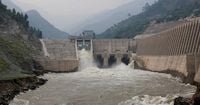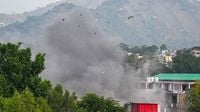On the night of May 6 to May 7, 2025, tensions between India and Pakistan escalated dramatically as both nations launched mutual bombardments, marking one of the most severe military confrontations between the two nuclear powers in decades. The conflict, which has resulted in at least 34 deaths, reignited following a deadly attack in Indian-administered Kashmir on April 22, where 26 civilians were killed by armed assailants. The recent military actions have drawn widespread international concern, prompting calls for restraint from various global leaders.
The Indian military initiated airstrikes targeting what it described as "terrorist infrastructures" within Pakistan, claiming these sites were linked to the planning of the April 22 attack. Indian missiles struck nine locations, including areas in Pakistani Kashmir and Punjab, resulting in significant civilian casualties. According to the Pakistani army, at least 26 civilians were killed, including young children, and 46 others were injured in the strikes and subsequent exchanges of fire.
In retaliation, the Pakistani military reported that it had engaged in artillery fire along the Line of Control (LoC), resulting in the deaths of eight civilians in the Indian village of Poonch. The violence has left both sides on high alert, with military operations intensifying throughout the night. Reports indicate that several Indian fighter jets may have crashed during the conflict, with Pakistan claiming to have shot down five Indian aircraft, including three Rafale jets.
The backdrop to this latest escalation lies in the historical animosity between India and Pakistan, particularly over the Kashmir region, which has been a point of contention since the partition of British India in 1947. The April 22 attack, which targeted tourists in Pahalgam, was attributed by India to the Pakistan-based militant group Lashkar-e-Taiba (LeT). Islamabad has denied any involvement, accusing India of orchestrating a narrative to justify its military actions.
During a press briefing, Indian officials emphasized that their operations were conducted with precision and aimed at minimizing civilian harm. Lieutenant Colonel Vyomika Singh stated, "Nine terrorist camps were struck and destroyed," asserting that the targets were carefully selected to avoid damage to civilian infrastructure. However, the Pakistani military reported significant damage to civilian areas, including a hydroelectric dam, which was allegedly hit during the strikes.
The international community has reacted to the rising tensions with alarm. The United Nations has warned that the world cannot afford a military confrontation between two nuclear-armed nations. U.S. Secretary of State Marco Rubio engaged with both Indian and Pakistani leaders, urging them to reopen dialogue to de-escalate the situation. Meanwhile, former U.S. President Donald Trump expressed hope that the confrontations would cease quickly, labeling the situation as "shameful."
France's Foreign Minister Jean-Noël Barrot called for restraint from both sides, acknowledging India's right to defend itself against terrorism but stressing the importance of civilian protection. He stated, "We understand India’s aspiration to protect itself against the scourge of terrorism, but we urge both India and Pakistan to exercise restraint to avoid escalation and to preserve civilian lives."
China has also expressed readiness to play a constructive role in easing tensions, with a spokesperson from the Chinese Foreign Ministry calling on both nations to remain calm. The British government has offered to mediate, stating it is "ready to intervene for de-escalation" and facilitate dialogue.
The Pakistani National Security Committee convened for an emergency meeting amid the escalating violence, with Prime Minister Shehbaz Sharif expected to address the nation following the discussions. In a statement, the Pakistani military condemned the Indian strikes as an "act of war," asserting its right to respond decisively to defend its territory.
As the situation continues to evolve, the potential for further escalation looms large. With both nations entrenched in their positions, the prospects for a diplomatic resolution appear increasingly tenuous. The international community remains vigilant, hoping for a return to dialogue and peace in a region long plagued by conflict.





